Submitted by Anonymous on
Par / by Maude Blanchet-Léger
| ENGLISH VERSION |
Le vendredi 31 juillet, j’arrive vers 11h45 au bureau et je monte rejoindre Thierry, avec qui j’étais heureuse de passer l’après-midi, puisque le dernier atelier à boulot vers auquel j’ai assisté avec lui s’était très bien déroulé. Il m’explique l’idée d’activité qu’il a eue; nous pourrions découper des carrés de toile sur lesquels les personnes écriraient d’un côté un problème que nous avons dans la société et de l’autre côté, une solution à ce problème. Nous accrocherions ensuite les deux morceaux de canvas sur les branches d’un arbre qui se retrouve dans leur milieu de vie, décorant ainsi leur environnement de manière éphémère. Cool! On découpe la toile et on rassemble tout le matériel pour se rendre à la van. Avant d’aller au parc, on fait un arrêt au supermarché afin d’acheter de la corde et plus de crayons et voilà, nous sommes prêt.es!
En arrivant au Parc Martin Luther-King, je réalise que nous ne manquerons probablement pas de participant.es. Je connais très peu le quartier et je suis un peu déconcertée de voir autant de personnes en situation d’itinérance.
Il fait nuageux avec des percées de soleil; c’est la température parfaite pour un atelier à l’extérieur. Nous commençons à sortir le matériel de la van et une personne vient nous parler. Elle nous demande si on a de la nourriture, non, mais on organise un atelier, on lui donne une bouteille d’eau et un masque. Elle nous demande ce que nous faisons et on lui explique qu’on vient réfléchir avec les gens et on lui parle de l’atelier. Elle nous conseille de ne pas rester de ce côté du parc, parce que c’est trop triste de voir tout ça et elle nous suggère d’aller de l’autre côté où c’est plus familial. Thierry lui répond que nous allons tout de même commencer ici, essayer de ce côté d’abord, parce que nous croyons que ces personnes ont aussi des choses importantes à dire.
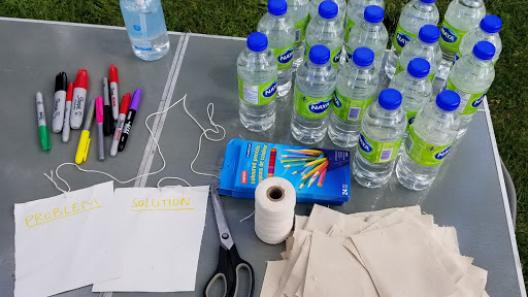
Nous installons la table et je fais la pancarte L’arbre des solutions et une van de bouffe arrive: tout le monde se sert. Une fois installé.es, un homme vient tout de suite vers nous et nous raconte un peu sa vie et fait des blagues. Il a vécu dans plusieurs pays et il est d’origine thaïlandaise. Il dit « moi pas québécois, moé québécoué » en se frappant sur le torse et en riant et on rit avec lui. Son autre blague préférée c’est qu’ici, le loyer est gratuit. Thierry et moi lui expliquons l’atelier, mais il a un sursaut et recule lorsqu’on lui propose d’écrire quelque chose. Il ne doit pas avoir l’habitude de se faire demander son avis et même s’il a pourtant beaucoup de choses à dire, il ne veut pas participer. Il nous accompagne tout de même tout au long de notre présence dans le parc.
Juste en face du parc se trouve une cafétéria communautaire. Une femme qui y travaille vient nous jaser, elle connait pas mal de gens ici. Un autre homme, Bruno*, connait déjà Exeko et il se souvient de Dukakis qui était venu la semaine passée. Il veut participer à l’atelier, mais demande à Thierry d’écrire ses idées pour lui. Il exprime que selon lui, le problème ici (en faisant un geste de main vers tout le parc) c’est qu’il y a trop de crack, mais que la police ne prend pas les bonnes actions et pénalisent les gens au lieu d’aller à la source du problème.
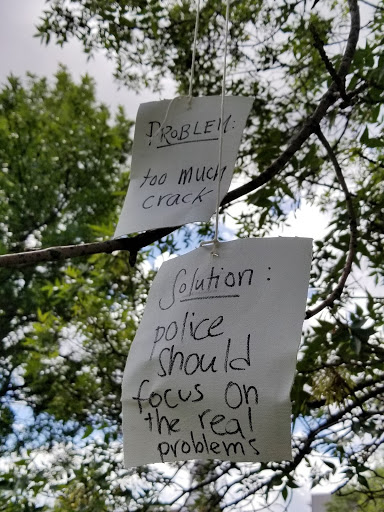
Bruno nous dit aussi que les autorités ont interdit l’accès aux salles de bain du parc à cause de la pandémie, donc les personnes vivant dans le parc n’ont nul part d’autre où aller que dans le jeu d’eau pour enfants afin de se laver. Il suggère donc de rendre accessible plus d’installations de besoins de base pour les personnes sans-abris.
Une autre personne souhaite participer; elle amène des crayons et s’installe sur l’herbe pour écrire à côté de son fils qui mange du mcdo. Elle écrit que les enfants et les familles ne se sentent pas les bienvenus dans certaines parties du parc et qu’il faudrait faire de ce parc un endroit pour tout le monde. Elle demande ensuite à Thierry d’accrocher sa création dans l’arbre pour elle.
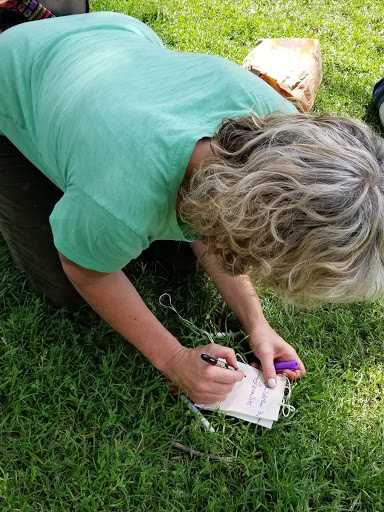
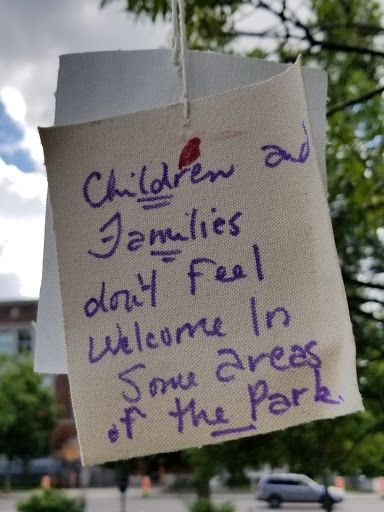

Pendant ce temps, les bouteilles d’eau partent vite et l’arbre est maintenant bien décoré. En partant, Bruno nous remercie avec un grand sourire et nous demande si on va revenir bientôt. Pendant que nous rangeons le matériel dans la van, un jeune homme s’arrête pour nous demander ce que nous faisons et qu’elle est notre mission. Il s’implique dans la cafétéria d’en face et souhaiterait faire plus bénévolat. Il semble vraiment intéressé et nous dit qu’il contactera Exeko. On roule direction métro Parc et en quittant, Bruno nous envoie des bisous de la main.
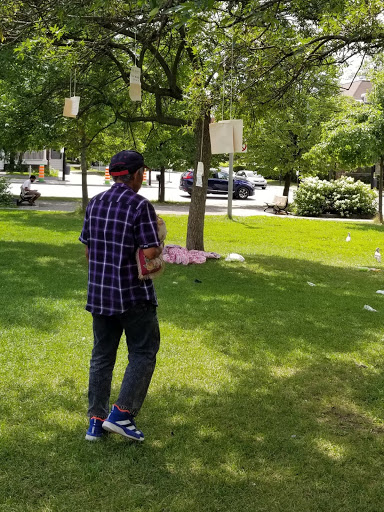
En arrivant au métro Parc, je remarque un rassemblement de gens, plus nombreux cette fois. Les bouteilles d’eau et les masques partent encore plus vite, mais quelques personnes restent pour nous parler.
Un homme se prononce sur la crise du logement et de sa difficulté à trouver quoique ce soit d’abordable et de salubre. Thierry propose donc d’écrire que la solution serait de bâtir plus de logements sociaux et l’homme est d’accord avec cette idée. Il nous parle aussi d’un événement récent où des gens occupaient l’espace sur le long de la rue Notre-Dame dans des tentes, faute de refuge. Le campement était toléré jusqu’à ce que tout le monde soit tassé par les autorités. Il suggère aux campeurs d’accrocher une banderole devant leur terrain afin de rendre leur geste et leur lutte plus explicite et de la légitimer. Thierry et moi trouvons que c’est une excellente idée!
Au même moment, je parle avec une autre personne qui arrive avec beaucoup d’enthousiasme. Lui, il veut de la bouffe pour tous! Il propose la création de plus de banques alimentaires et d’encourager les restaurants et les gens à moins gaspiller de nourriture et à donner plus aux banques. J’accroche par la suite ses idées dans l’arbre derrière nous.
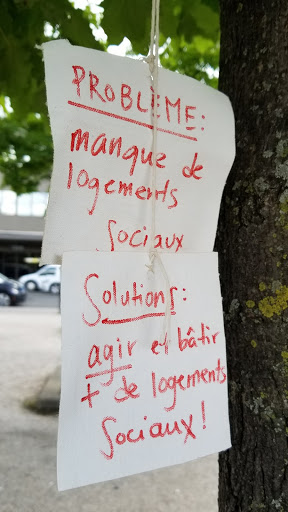

Puisque nous n’avions plus de bouteilles d’eau, que le soleil sortait et qu’il commençait à faire très chaud, je suis allée en acheter au supermarché à côté du métro.
En revenant, un homme s’approche timidement et nous le saluons. Une fois qu’il a su ce que nous faisions, il en avait beaucoup à dire. Il nous parle de la paix intérieure et de comment les gens ne sont pas à l’écoute des autres, mais aussi d’eux-même. À la fin de notre conversation, il nous remercie et avoue que ça lui a fait beaucoup de bien de se vider le coeur. Je tente de résumer ses pensées en deux phrases et je les accroche dans l’arbre.
Dix minutes plus tard, l’homme avec qui nous parlions de la crise du logement revient avec un article de journal de la veille sur l’événement en question. Il semble vraiment outré par l’expulsion du campement et nous sommes tous les trois d’accord qu’il s’agit d’une décision complètement illogique, car ces gens n’ont nul part d’autre où aller et leur situation est encore plus difficile depuis la pandémie. En faisant ceci, on ne fait que réprimer une fois de plus ceux et celles qui ont le plus besoin d’aide. Après une discussion d’une dizaine de minutes, il nous remercie et nous dit « lâchez pas, j’aime vraiment ça ce que vous faites. »
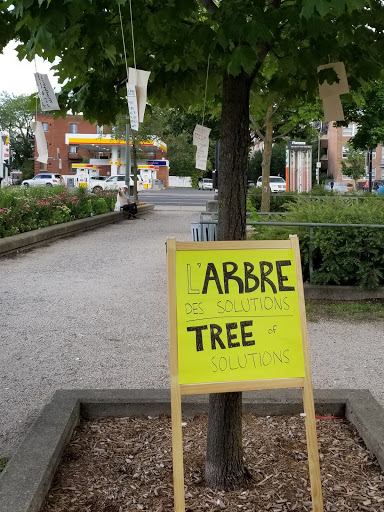
Il est temps de partir, alors on range le matériel et on désinfecte le tout une dernière fois. En marchant vers la van et sur le chemin du retour, Thierry et moi parlons des réactions des participant.es. Nous savons qu’au moins trois ont aimé notre atelier et nous ont directement remercié et plusieurs semblaient vraiment content.es de nous voir. J’espère que cette activité a pu leur apporter un moment de réflexion, mais aussi un petit temps de repos, voire de distraction dans leur journée.
*Les noms utilisés dans le texte sont fictifs et ont été changés pour préserver l’anonymat.
Toutes les photos de l'article sont l'oeuvre de l'autrice, Maude Blanchet Léger.
idAction mobile: The tree of solutions
On Friday, July 31, I arrive at around 11:45 am at the office and I go upstairs to join Thierry, with whom I was happy to spend the afternoon, since the last work workshop that I attended with him went very well. He explains to me the idea he had for today’s activity; we could cut out squares of canvas where people could write on one side a problem we have in our society and a solution to that problem on the other side. We would then hang the two pieces of canvas on the branches of a tree that is found in their living environment, thus decorating their living space in an ephemeral way. Cool! We cut the canvas and collect all the material to get to the van. Before heading to the park, we stop at the supermarket to buy some rope and more pencils and voila, we are ready!
Arriving at Martin Luther-King Park, I realize that we will probably not run out of participants. I don’t know anything about this neighborhood and I am a little surprised to see so many homeless people.
It is cloudy with bursts of sun; it’s the perfect temperature for an outdoor workshop. We start to take the equipment out of the van and right away someone comes to talk to us. She asks us if we have food, no, but we’re organizing a workshop, we give her a bottle of water and a mask. She asks us what we are doing and we explain to her that we are here to reflect on society with people and we talk to her about the workshop. She advises us not to stay on this side of the park, because it's too sad to see all of this and she suggests that we go to the other side where it's more family-friendly. Thierry tells her we're going to start here anyway, try this side first, because we think these people have important things to say too.
We set up the table and I put up the Tree of solutions sign and a food van arrives: everyone helps themselves. Once installed, a man comes immediately towards us and tells us a bit about his life and makes jokes. He has lived in several countries and is from Thailand. He says "moi pas québécois, moé québécoué", slapping himself on the chest and laughing and we laugh with him. His other favorite joke is that the rent here is free. Thierry and I explain the workshop to him, but he gasps and pulls back when asked if he wants to write something. He is probably not used to being asked for his opinion and although he does have a lot to say, he doesn't want to participate. Nonetheless, he stays with us throughout our presence in the park.
Right in front of the park is a community cafeteria. A woman who works there comes to talk to us, she seems to know a lot of people around here. Another man, Bruno*, already knows Exeko and he remembers Dukakis who came last week. He wants to participate in the workshop, but asks Thierry to write down his ideas for him. He expresses that according to him, the problem here (waving his hand towards the whole park) is that there is too much crack, but that the police do not take the right actions and penalizes the people instead of going to the root of the problem. Bruno also tells us that the authorities have banned access to the bathrooms in the park due to the pandemic, so the people who live in the park have nowhere else to go than in the water fountains made for children in order to wash themselves. He then suggests that we need to make more basic facilities accessible to homeless people.
Another person wishes to participate; she brings pencils and settles on the grass to write next to her son who is eating mcdonalds. She writes that children and families do not feel welcome in some areas of the park and that this park should be made a place for everyone. She then asks Thierry to hang her creation in the tree for her.



Meanwhile, the water bottles are almost all gone and the tree is now nicely decorated. Before leaving, Bruno thanks us with a big smile and asks us if we will be back soon. While we are packing the equipment into the van, a young man stops, wondering what we are doing and what our mission is. He is doing volunteering in the cafeteria across the street and would like to do more. He seems really interested and says that he will contact Exeko. We drive towards metro Parc and when leaving, Bruno blows us kisses.
When we get to the metro Parc, I notice a gathering of people, more numerous this time. The water bottles and masks run out even faster, but a few people stay to talk to us.
A man speaks out on the housing crisis and how it’s difficulty for him to find anything affordable and sanitary. Thierry therefore proposes to write that the solution would be to build more social housing and the man agrees with this idea. He also tells us about a recent event where people occupied the space along Notre-Dame Street in tents, because of a lack of shelter. The campement was tolerated until they were evacuated by the authorities. He suggests that the campers could hang a banner in front of their site in order to make their gesture and their situation more explicit and to legitimize it. Thierry and I think this is a great idea! As he leaves, he thanks us and says "keep it going, I really like what you do. "
At the same time, another person arrives with great enthusiasm and I start speaking with him. He wants food for everyone! He proposes to create more food banks and to encourage restaurants and people to waste less food and to donate more to those banks. I then hang his ideas in the tree behind us.

Since we had run out of water bottles, the sun was coming out and it was getting very hot, I went to buy some more from the supermarket next to the metro.
Coming back, a man approaches timidly and we greet him. Once he found out what we were doing, he had a lot to say. He tells us about inner peace and how people are not listening to others, but also to themselves. At the end of our conversation, he thanks us and admits that it did him a lot of good to talk with us. I try to sum up his thoughts in two sentences and hang them in the tree.
Ten minutes later, the man we were talking to about the housing crisis returns with a newspaper article from the day before about the event. He seems genuinely outraged by the expulsion of the campers and the three of us all agree that this is a completely illogical decision, as these people have nowhere else to go and their situation is even more difficult since the pandemic. By doing this, we only repress once again those who need help the most.

It is now time to go, so we put the equipment away and disinfect it one last time. Walking towards the van and on the way back, Thierry and I talk about the reactions of the participants. We know that at least three people liked our workshop and thanked us personally and several seemed really happy to see us. I hope this activity gave them a moment of reflection, but also a little time to rest, or even a small distraction in their day.
*Names in the text have been changed in order to keep anonymity.
Every pictures are credited to the author, Maude Blanchet-Léger.










 Laurier
Laurier